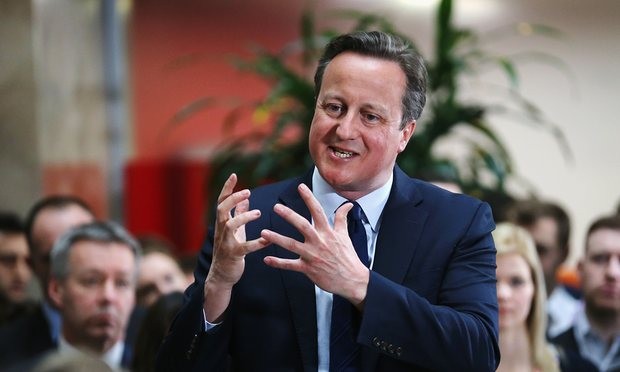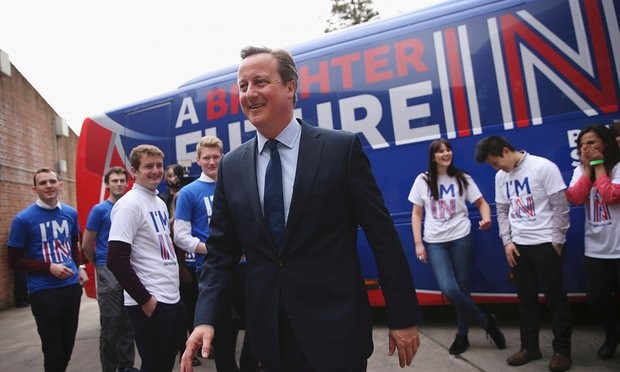Britons go furious on David Cameron’s links to Panama papers, urge him to resign

David Cameron was in Washington rubbing shoulders with world leaders, sun-tanned and relaxed after a holiday in Lanzarote, when an email revealing what the Guardian knew about his father’s tax affairs dropped on Conservative HQ.
From that moment, the prime minister would have known there was a serious risk of people finding out about the £30,000 of shares he previously owned in Ian Cameron’s offshore investment fund.
It would look terrible to a public already outraged about tax avoidance that a wealthy young Cameron had chosen to buy shares in Blairmore, the fund based in Panama and the Bahamas that never paid a penny of tax in Britain.
This was the point at which Cameron should have made a clean breast of the facts, Labour and some of his own Conservative MPs now say.
Leadership challenge
It would have saved the prime minister the worst week of his professional life, which has ended with calls for him to resign, a flurry of bets on a leadership challenge this year and undermined public trust in his premiership.
But faced with a choice, Downing Street opted for the tactics that have worked so well for Cameron in previous crises: deflect, dismiss and deny until the story ebbs away.
The spin doctors adopted this approach back in 2012, when Guardian journalists first revealed that Ian Cameron’s wealth had been built offshore. Downing Street then refused to comment, saying it was a private matter for the Cameron family. By remaining tight-lipped, the story ended up disappearing from the headlines within days.
No 10 picked up this same baton on Monday at the regular briefing for the political press pack, when the reporters asked his official spokeswoman whether the prime minister was aware that his father had set up a fund that has never paid UK tax.
“Most of you seem to be aware that that story was written in 2012 and we responded at the time. I don’t have anything to add to that,” she said. The Guardian pressed further on whether the Cameron family still had any money invested in the fund: “That is a private matter.” She added that the government “has taken a range of action to tackle tax evasion and avoidance and aggressive tax planning”.
But the phrase would no longer quell the questions. The Guardian broke the story on its website that evening and led the paper the next day with the headline: “The hidden deals that helped David Cameron’s father avoid paying UK tax.”
The other papers followed the Guardian story, leaving the prime minister facing a dire set of headlines from across the political spectrum on Tuesday morning.
Corbyn’s response
The Labour leader, Jeremy Corbyn, and John McDonnell, the shadow chancellor, had initially been wary of being seen to attack a fellow politician’s family background. But by Tuesday morning, it was clear the story was more about Cameron’s own refusal to answer questions than about his father. Corbyn told broadcasters that Cameron should explain himself and suggested Blairmore should be investigated by HMRC along with other clients of Mossack Fonseca, the law firm at the heart of the Panama Papers leak.
The timing could not have been worse for the prime minister, who was due to give a speech about the EU referendum in Birmingham at PwC – a firm of accountants once described by MPs as having promoted tax avoidance “on an industrial scale”.
Under pressure, his aides had negotiated for Sky News to be the sole media organisation allowed a question to the prime minister. Meanwhile, all journalists were required to wear yellow tags to mark them out in the crowd from PwC employees, who were unlikely to ask anything controversial in front of their bosses.
The prime minister had prepped his answer, but the question from Faisal Islam, the Sky News political editor, was formulated in a tough way: “Can you clarify for the record that you and your family have not derived any benefit in the past and will not in the future from the offshore Blairmore Holdings fund mentioned in the Panama Papers?”
After a little preamble about HMRC investigating any wrongdoing, Cameron got to the pre-scripted line about his own finances – answering in the present tense only.
“In terms of my own financial affairs, I own no shares. I have a salary as prime minister and I have some savings, which I get some interest from and I have a house, which we used to live in, which we now let out while we are living in Downing Street and that’s all I have. I have no shares, no offshore trusts, no offshore funds, nothing like that. And, so that, I think, is a very clear description,” he said.
It was indeed a clear description of his current financial affairs, but far from so about the past or future, prompting a fresh round of questions from media organisations. The Guardian pressed Downing Street again with questions about whether he had benefited from Blairmore in the past or could stand to inherit shares in it from his mother, Mary. No 10 sources reacted furiously, attempting once again to draw a line under the affair with a challenge to Cameron’s critics to “put up or shut up”.
When the broadcasters led on the story for the second day in a row, Downing Street released yet another clarification early on Wednesday: “There are no offshore trusts or funds from which the prime minister, Mrs Cameron or their children will benefit in future.”
That only left the past. Further questions about how Cameron had benefited from Blairmore went unanswered that evening, as Downing Street went into lockdown to figure out how best to deal with the persistent crisis.

They had clearly come up with a new approach by Thursday morning, as the ITV’s political editor, Robert Peston, was among journalists who headed down to Exeter in Devon to hear the prime minister speak to students about the EU referendum. The students gave him a tricky time, with one of them ribbing him about his “personal experience” of tax avoidance, and journalists were not allowed free rein to ask him questions. Cameron had his photograph taken with a pro-EU bus in a gated area away from most of the press, before sitting down with Peston for a defiant interview revealing his secret.
There was no apology from the prime minister as he told ITV that he had owned shares in Blairmore from 1997 until 2010, just before he became prime minister. He insisted he was proud of his father’s business, that it had never been set up to avoid tax, and that it had been a “difficult few days”.
But the fallout was immediate, with some Labour MPs suggesting he should resign and the opposition frontbench demanding he come to parliament to explain himself. The bookmakers revealed he is odds-on to lose his leadership before Jeremy Corbyn for the first time. A YouGov survey found just 18% of the public thought he had been open and honest about his tax affairs, while 56% did not.
Conservative ministers were sent out on to the airwaves to defend Cameron, claiming it had been too painful for him to talk about his late father’s business.
But on the backbenches, the anger about the handling of the crisis is real, adding to fury about the unravelling of the budget and the ferocity of No 10’s determination to win the EU referendum. In public, Tory MPs have limited themselves to criticising Downing Street advisers for mishandling the affair, but behind closed doors, they increasingly express a view that “David is damaged” and are turning their minds more than ever to political life after Cameron.
How to submit an Op-Ed: Libyan Express accepts opinion articles on a wide range of topics. Submissions may be sent to oped@libyanexpress.com. Please include ‘Op-Ed’ in the subject line.
- North African leaders to hold summit in Libya - October 21, 2024
- Libyan MP predicts dollar tax reduction to 5% by Year-End - October 21, 2024
- Debate over CNN’s reporting reignited on X by Musk - October 21, 2024


